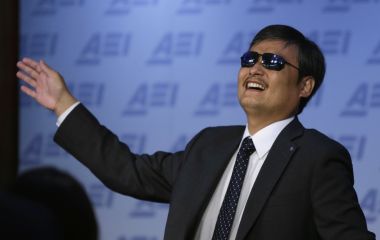The brutal truth behind forced abortions in China

A Nobel peace prize nominee has accused the Chinese government of having "contempt for the lives of human beings".
Civil rights activist Chen Guangcheng condemned the country's one child policy during an address at The Heritage Foundation last month. He said the government often forces women to have an abortion against their will if they are found to be pregnant without a permit.
"After several decades of the One Child Policy implementation and the use of forced abortion, the Chinese people live in an atmosphere of fear of the government," Guangcheng said, adding that his own personal investigation in China in 2005 found that over 100,000 women had had abortions unwillingly.
"Through all these years of policy implementation and propaganda, the Chinese Communist Party wants the Chinese people and the public to know that they have to follow their orders in family planning policy or one child policy implementation or else they will suffer and pay a huge price for what they call the violation of the rules," he continued.
"[This] has demoralized the Chinese society, switching it from a society that highly values life to a social decay where society looks down on and has a contempt for the individual lives of human beings."
Guangcheng said there are few ways to protect Chinese people from "inhumane treatment" at the hands of the Communist government.
"Whenever a forced abortion occurs, the party chief, who is the top administrator in China, orders the police department and the courts system not to touch these cases. There is no law in place to protect the people," he said.
Also speaking at The Heritage Foundation was Reggie Littlejohn, President of Women's Rights Without Frontiers. She joined Guangcheng's condemnation of the CCP, saying it "continues to brutalize women" through the one child policy.
"News of forced abortion rarely reaches the West, because of the media ban imposed by the Chinese government," she said. "For every forced abortion published in the western press, there are hundreds or thousands of women suffering in silence and obscurity.
"The victims of forced abortion and sterilization have nowhere to turn. They are protected by neither the police nor the court system. Their own government, which should be protecting their rights, has become their 'public enemy.'"
Littlejohn therefore called on the Western community to be a "voice for these voiceless ones", citing a moral obligation to speak out.
"We need to band together to end these atrocities," she said.
Chinese Christian commentor Sean Tseng confirmed to Christian Today that forced abortions are a reality for many women living in China.
"There are a lot of accusations in Chen's talk, but I want to say from my experience that they are all true," he said.
"I don't know how accurate the numbers are, but I have an aunt who worked as a 'family planning' officer in a small town in rural Guizhou, and she told me a lot of stories of going to people's houses, them being beaten up and having forced abortions, so it's true."
Tseng said the law is not as strict as it once was; many families in Chinese cities have several children and pay the government a fine for the privilege. But poor families in rural communities who cannot afford to do so are regularly forced to terminate their pregnancies.
There are Christians campaigning to change the law, however. On June 1 this year, Pastor Wang Yi of the Early Rain Reformed Church in Chengdu was arrested for distributing anti-forced-abortion leaflets in the street. Formerly a law professor, he was detained for at least two days for contesting the one child policy.
"Wang Yi and those like him would support Chen on [his stance on] forced abortion absolutely. Chen is right; human life is given by God and we should cherish it. Forced abortion is evil, there's no other way to describe it – it is evil," Tseng said.
"This is real, this is China. A lot of western Christians are understandably excited about growth of Christianity [in China] and they say as long as the Gospel is being spread we are happy, but the relationship between religion and politics in China is very complicated."
According to a prominent civil rights activist, half of the 50 most senior civil rights lawyers in China are Christians. Tseng said he knows several of them, and many of them are fighting against forced abortions.
"It's about God-given life. It comes down to theology, philosophy, and your view on life, so it's very, very important," he said.
"Most Christians, especially in the house church movement, would stand together with Chen and support him on this."











